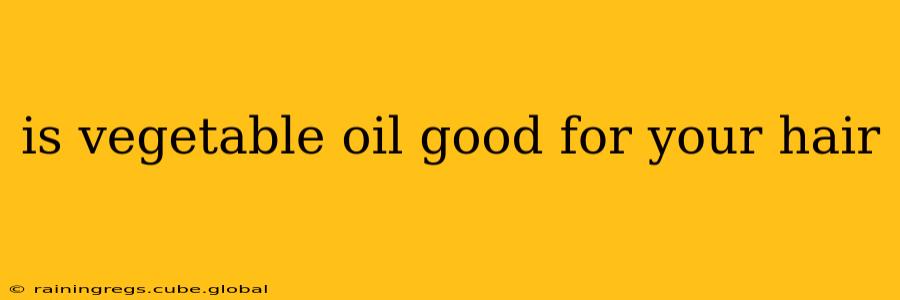Vegetable oil, a broad term encompassing various plant-based oils like coconut, olive, avocado, and jojoba, has gained popularity as a natural hair care remedy. But is it truly good for your hair, and if so, how should you use it? This comprehensive guide explores the benefits, drawbacks, and best practices for using vegetable oils to achieve healthy, lustrous locks.
What are the benefits of using vegetable oil on hair?
Many vegetable oils boast properties beneficial for hair health. These oils are rich in fatty acids, vitamins, and antioxidants that nourish the scalp and strands. The benefits often include:
- Deep conditioning: Oils penetrate the hair shaft, moisturizing dry, brittle hair and improving elasticity. This is particularly helpful for those with damaged or chemically treated hair.
- Reduced frizz and flyaways: The moisturizing properties of vegetable oils help smooth the hair cuticle, reducing frizz and making hair more manageable.
- Increased shine: Healthy, hydrated hair reflects light better, resulting in a noticeable increase in shine and luster.
- Scalp health: Some oils possess anti-inflammatory and antimicrobial properties that can soothe an irritated scalp and potentially reduce dandruff.
- Protection from heat damage: Applying oil before heat styling can create a barrier, protecting hair from damage caused by high temperatures.
What type of vegetable oil is best for hair?
The "best" vegetable oil depends on your specific hair type and concerns. Some popular choices and their benefits include:
- Coconut oil: Penetrates the hair shaft effectively, moisturizing and strengthening it. Excellent for all hair types, particularly dry and damaged hair.
- Olive oil: Rich in antioxidants, it conditions and adds shine. Suitable for most hair types, but might be too heavy for fine hair.
- Avocado oil: High in vitamins and healthy fats, it deeply moisturizes and promotes hair growth. Ideal for dry, damaged, or color-treated hair.
- Jojoba oil: Closely resembles the sebum produced by your scalp, making it a great option for balancing oil production and treating scalp conditions. Suitable for all hair types.
- Argan oil: Rich in vitamin E and fatty acids, it moisturizes, adds shine, and protects against damage. Excellent for all hair types, especially dry and brittle hair.
Can vegetable oil damage your hair?
While generally beneficial, using vegetable oil improperly can lead to some drawbacks:
- Build-up: Overuse or improper rinsing can lead to product build-up, making hair look greasy and limp.
- Clogged pores: Applying too much oil to the scalp can clog pores, potentially leading to scalp irritation or acne.
- Weighting down fine hair: Heavier oils like coconut or olive oil might weigh down fine or thin hair, making it appear flat and lifeless.
How often should I use vegetable oil on my hair?
The frequency of use depends on your hair type and the oil you're using. As a general guideline:
- Dry or damaged hair: You might benefit from using vegetable oil as a deep conditioner once a week or even twice a week.
- Normal hair: Once every two weeks or monthly might be sufficient.
- Oily hair: Use sparingly, perhaps as a leave-in treatment on the ends only, or just once a month.
Always listen to your hair; if it feels too heavy or greasy, reduce the frequency of application.
How should I apply vegetable oil to my hair?
Start with a small amount and gradually increase as needed. Apply the oil to damp or dry hair, focusing on the ends and working your way up. Leave it in for at least 30 minutes, or overnight for a deeper conditioning treatment. Rinse thoroughly with a mild shampoo to remove any excess oil.
Are there any side effects to using vegetable oil in my hair?
Generally, vegetable oils are safe for most people. However, some individuals might experience allergic reactions, such as redness, itching, or swelling. Perform a patch test on a small area of skin before applying the oil to your entire scalp or hair.
What are the differences between using vegetable oil and other hair treatments?
Vegetable oils provide natural moisturization and conditioning, whereas other hair treatments might contain chemicals that could potentially cause irritation or damage with long-term use. However, commercial products often offer convenience and specialized formulations for specific hair concerns.
Is it necessary to use a conditioner after applying vegetable oil?
Using a conditioner after applying vegetable oil is generally not necessary, particularly if you're using the oil as a deep conditioner. However, if you find your hair feels dry or brittle even after using oil, you can follow up with a light conditioner. But remember to avoid over-conditioning, which can also lead to buildup.
This information is for general knowledge and does not constitute medical advice. Always consult a dermatologist or trichologist if you have specific hair or scalp concerns.
